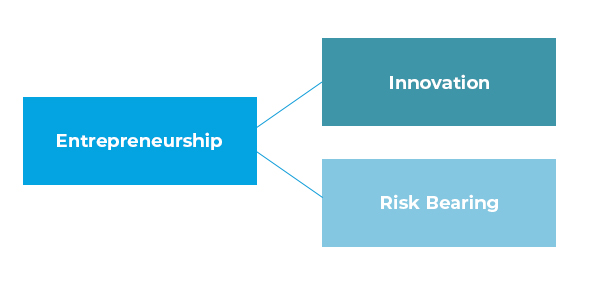Being an entrepreneur is the next big fad!

Stories of people like Mark Zuckerberg, Evan Spiegel, and John Collison amassing billions of dollars in their twenties have catapulted the idea of entrepreneurship into mainstream fame in recent years.
Almost every other kid’s Facebook bio now reads “Entrepreneur at *insert initials* Limited”.
Whether this trend is beneficial or not is a whole different debate. Regardless, one thing is for sure: people are gravitating more and more towards working for themselves and being financially free than ever before.
This can be attributed to access to the vast amount of opportunities humans have today due to the Internet and the examples of people who have used these opportunities to create their own empires and get extremely rich in the process.
This increasing interest in entrepreneurship has been accompanied by the growing critique of what elements are most necessary for an entrepreneur to be successful. Being innovative is one of these highly analyzed components.

Where some of the most successful entrepreneurs of our time innovators?
At first glance, it would seem that extremely popular companies like Facebook, Instagram, and Twitter were NOT based on entirely innovative grounds.
According to the Cambridge Dictionary, the definition of innovative is “using new methods or ideas”.
When Facebook was founded in 2004, there were already very similar and highly successful social media sites like Myspace, Orkut, and Friendster in operation. The idea of a website that could be used for connecting with friends and family members was not an entirely new one.

Instagram and Twitter also did not introduce completely new concepts.
Sites like Imgur, Tumblr, and Flickr that allowed users to share images and videos online were already doing quite well for themselves when Instagram first started.

Giving short descriptions of what someone is feeling in the form of text, photos, and videos was also not the invention of Twitter, rather many sites (including Facebook) already had this feature.
There were even a bunch of search engines around before Google came along!
Does this mean innovation is irrelevant for entrepreneurship?
The short answer to this is: NO! And these are the reasons why:
- The reality of what Innovation actually means in the entrepreneurial world.
One thing that you need to realize is that in the modern business world, no idea can ever be truly new.
In 1901 patent commissioner Charles Duell famously told Congress that “everything that can be thought of, has been thought of”.
It is very unlikely, nearly impossible, for you to come up with an idea for a startup that hasn’t already been either tried or at least thought of before you.
And history proves that it is futile to spend one’s time thinking of entirely new ideas rather than looking at what already is and pondering upon how it can be made better.
- Facebook, Twitter, and Instagram were innovative!
With this new definition of innovation in the entrepreneurial world in mind, if we look at the previously mentioned companies, we will find that each one of them was innovative.
Facebook capitalized on the internet gaming industry as it not only allowed its users to play online games on the platform but also allowed developers to develop their own games for Facebook.

I remember first making an account on Facebook just to play FarmVille since it was all the rage back then, and I wasn’t the only one who started off using Facebook as a platform for games and then slowly transitioned to becoming a regular user.
It was also the fact that Facebook seamlessly introduced new features on its platform like designing ads, page customization for businesses, and targeting certain audiences with posts that other competitors were simply not able to keep up with.
Instagram with its simple and sleek design captured users’ attention and then promoted influencers to use their platform which in turn resulted in more followers.
Google also started expanding their activities into many areas other than simply being a search engine such as advertising, smartphone technologies, and other development tools.
All these successful companies, though were very similar in their initial core objectives with other competitors, saw innovative opportunities for them to improve their services and capitalized on them.
- Innovation is, in fact, integral to successful entrepreneurship.
The importance of innovation in making a business successful can be understood by this very simple example:

There is a person who decides to sell fruits online. When researching the market, he finds out that there are already online vendors following this exact same business model. If he is to ignore being innovative and making himself stand out from others, there is very little to no reason for customers to leave their current vendors and come to him.
Being innovative in this situation doesn’t mean looking for a whole new business model altogether. An innovative entrepreneur would, in this case, look for how he can make his services different and more valuable to the customers.
Maybe he can work on selling his items on a lower price than the competitors, or he can try and make his business more accessible to the consumer by providing cheap and quick delivery. Basically the focus should be working on anything that would give him an edge over the competitors.
It isn’t all about innovation though.
While being innovative is definitely something every successful entrepreneur should focus on, it should be kept in mind that innovation alone will not necessarily make you a successful entrepreneur. And neither can the success of companies like Facebook be attributed to innovation by itself.
There are many other aspects that play an equally important part in an entrepreneur’s career. These include motivation, versatility, flexibility, and decisiveness among others.


